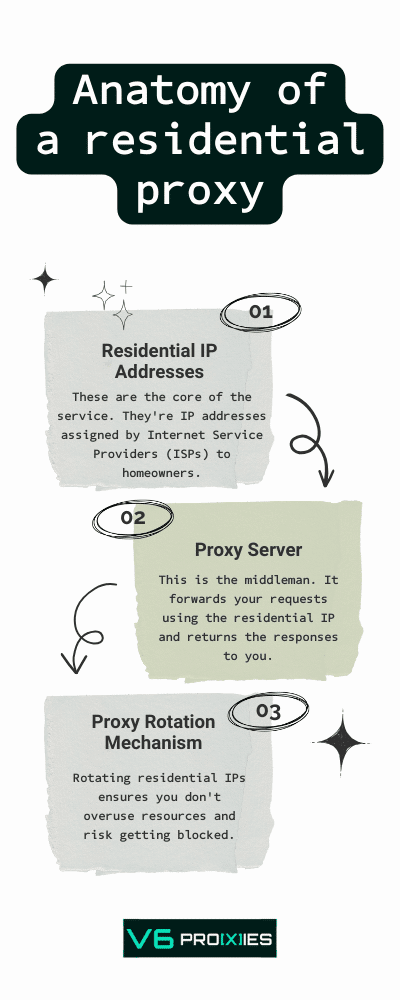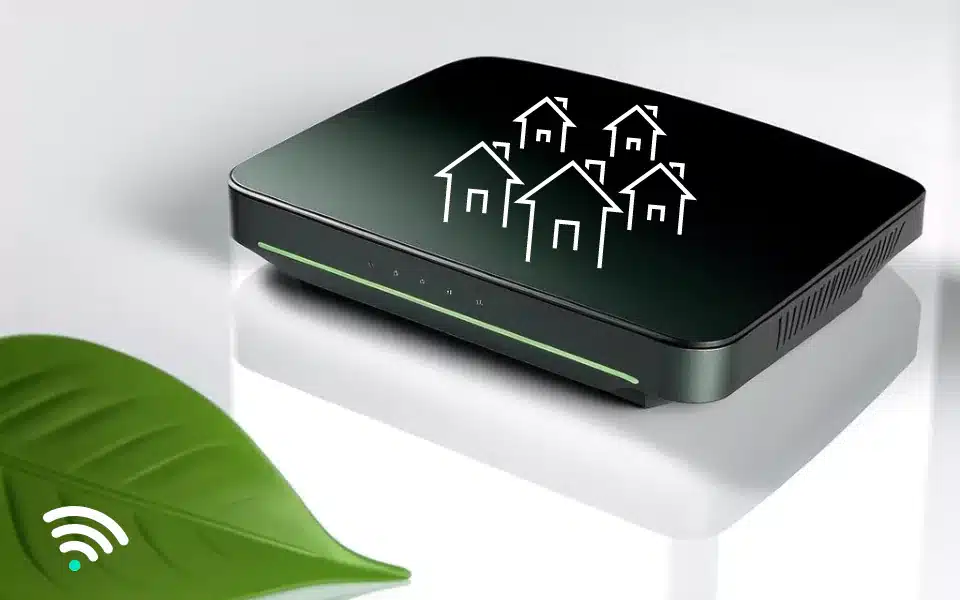What are residential proxies? How do they work? and what are the differences between them and other proxy types?
Use this simple guide to understand how residential proxies are not just about online anonymity but a strategic tool for businesses to gain an edge. Discover their role in market research, data scraping, and ensuring uninterrupted business operations.
Table of Contents
How do residential proxies work?
Residential proxies let you browse the internet using someone else’s home IP address. Think of it like borrowing your neighbor’s Wi-Fi to access a website. Let’s show how it works step by step.
- Your Computer: You Start With Your Computer Or Smartphone. Let’s Say You Want To Visit A Website.
- Request: When You Type The Website’s Address And Hit Enter, Your Computer Sends A Request To That Website To Show You Its Content. Residential Proxy: But Before Your Request Reaches The Website, It Goes Through Something Called A “Residential Proxy.” Think Of This As A Middleman.
- Middleman’S Role: The Residential Proxy, As A Computer In Someone Else’s Home, Takes Your Request And Sends It To The Website On Your Behalf.
- Website’s Perspective: Now, From The Website’s Point Of View, It Looks Like The Request Is Coming From The Middleman’s House (The Residential Proxy) And Not From Your Computer. It’s A Bit Like Sending A Friend To Buy Something For You Instead Of Going Yourself.
- Website Responds: The Website Then Sends Its Response Back To The Residential Proxy, Thinking It’s Talking To The Middleman’S House.
Additional Considerations
- IP Rotation: Many Residential Proxy Services Offer IP Rotation, Periodically Changing The Residential IP Address Used For Your Requests. This Practice Helps Evade Detection And Blocking By Websites.
- Authentication: Imagine You Want To Use A Residential Proxy Service, Like Renting A Secret Agent’s Help (The Proxy). They Want To Be Sure That Only The Right People Can Use Their Secret Agents (Proxies), So They Ask You To Prove You’re Allowed.
- Geolocation: Residential Proxies Can Be Employed To Access Location-Specific Content By Utilizing IP Addresses Linked To The Desired Geographical Region.
- Rate Limiting: To Prevent Misuse, Residential Proxy Services Might Impose Rate Limits On The Number Of Requests You Can Make Within A Specified Time Frame.
Anatomy of a residential proxy
- Residential IP Addresses: These Are The Core Of The Service. They’re IP Addresses Assigned By Internet Service Providers (ISPs) To Homeowners.
- Proxy Server: This Is The Middleman. It Forwards Your Requests Using The Residential IP And Returns The Responses To You.

What are the types of residential proxies?
Residential proxies come in various types, each designed for specific purposes. Here are some common varieties:
1. Dedicated Residential IPs:
Dedicated residential proxies offer exclusive access to a single residential IP address. They’re best for tasks requiring consistency and no IP rotation.
2. Rotating Residential IPs:
Rotating residential proxies provide a pool of residential IPs that change regularly to avoid detection and website bans. There are two types:
- Sequential Rotation: Internet protocol(IP) addresses are used in order, cycling back to the beginning.
- Random Rotation: Internet protocol (IP) addresses are selected randomly for each request.
3. Static Residential IPs:
Static residential proxies offer fixed internet protocols (IPs) that don’t change, suitable for tasks needing consistent IPs. For example,
- Web Scraping: Businesses use them to scrape data from websites. For instance, a business might want to collect information about product prices from different e-commerce sites to adjust their own pricing.
- SEO Monitoring: SEO professionals use them to track search engine rankings and gather data on how websites are performing in different locations. This helps them optimize content and keywords accordingly.
| Dedicated proxies | Rotating proxies | Static proxies | |
| performance | Highest | Relies on number of users | High |
| Exclusivity | Private | Shared | private orshared |
| Cost | Most expensive | Vary in price | Lowest price |
| Stability | moderate stability | Lower stability | Highest stability |
Each type serves distinct purposes, so choosing the right one depends on your needs, including anonymity preferences, IP rotation requirements, and geographical targeting. Selecting the appropriate residential proxy type is crucial for successful online activities.
Read in Detail: Static Vs Rotating Residential proxies
Residential vs Datacenter
Residential and Data Center proxies stand out as the most prominent in the market. Each has its unique attributes, advantages, and use cases.
In brief, the choice between residential and data center proxies relies on specific needs, with residential proxies offering greater anonymity but potential slowness and cost, while data center proxies provide speed and affordability at the expense of trustworthiness and bans in some cases.
Residential vs Datacenter Proxies:
| Factor | Residential Proxies | Datacenter Proxies |
|---|---|---|
| Cost | Higher cost for residential IPs, with great benefits justifying that. | Lower cost for datacenter IPs, providing budget efficiency. |
| Speed | Vary from fast to slow based on residential connection speeds. | Consistently fast speeds of 100Mbps+ through datacenters. |
| Rotation | Offers IP rotation providing anonymity. | Static IP addresses. |
| Detectability | Highly anonymous and difficult to detect. | More detectable due to datacenter IP origins. |
| Use Cases | Ideal for scraping, ad verification, geo-targeting. | Excellent for hosting, automation, internal usage. |
| Concurrency | Scale to thousands of concurrent IP requests at once. | Typically allow hundreds of concurrent IPs at once. |
| Exclusivity | Shared IPs across many users. | Offers dedicated IPs for sole usage. |
What Are Residential Proxies Good For?
Residential proxies offer a multitude of valuable applications thanks to their efficiency. They excel in various online tasks, including:
- Data Extraction: This Type Of Proxy Servers Is Perfect For Web Scraping, Enabling Users To Collect Data From Websites Without Facing Blocks Or Detection. This Data Is Invaluable For Market Research, Competitive Analysis, And Information Aggregation.
- Overcoming Geo-Restrictions: By Utilizing IP Addresses From Specific Regions Or Countries, Residential IPs Help Users Bypass Geographic Restrictions Imposed By Websites And Streaming Platforms, Granting Access To Otherwise Restricted Content.
- Ad Verification: Advertisers And Marketers Leverage Residential Proxies To Confirm The Correct Placement And Visibility Of Online Ads In Different Geographic Areas, Ensuring Ad Campaigns Perform As Intended. Price Comparison And Sneaker Purchases: Online Shoppers And Sneaker Enthusiasts Utilize Residential IPs To Compare Prices Across E-Commerce Sites And Boost Their Chances Of Acquiring Limited-Release Sneakers.
- Market Research: Businesses And Researchers Benefit From Residential Proxies To Conduct Market Research, Exploring Various Local Markets And Trends By Accessing Online Platforms From Different Geographic Perspectives.
- SEO Monitoring: SEO Professionals Employ Residential Proxies To Monitor And Track Search Engine Results From Various Locations, Assessing The Effectiveness Of Their SEO Strategies And Regional Rankings.
- Social Media Management: Social Media Marketers Employ Residential Proxies To Efficiently Manage Multiple Social Media Accounts, Interact With Diverse Audiences, And Prevent Account Suspensions Or Bans.
- Privacy Enhancement: Individuals Concerned About Online Privacy Can Employ Residential Proxies To Obscure Their Actual IP Addresses And Enhance Their Anonymity While Browsing The Web.
- Avoiding IP Bans: Gamers And Users Of Online Services Utilize Residential Proxies To Circumvent IP Bans In Multiplayer Games And On Websites With Stringent Access Policies.
- Security Testing: Security Experts And Ethical Hackers May Employ Residential Proxies For Security Assessments And Penetration Testing To Simulate Attacks From Different Geographic Origins.
- Brand Protection: Companies Deploy Residential Proxies To Safeguard Their Brands Online By Monitoring Unauthorized Usage, Counterfeit Products, And Trademark Violations Across Various Regions.
Where to buy residential proxies?
To obtain residential proxies, you can:
- Use Residential Proxy Providers Like V6proxies
- Explore Peer-To-Peer (P2P) Network.
- Consider Proxy API Services For Programmatic Access.
- Look For Proxies On Proxy Marketplaces Or Forums.
- Set Up Your Own (Do It Yourself ( DIY)) Residential Proxies By Leasing Or Buying Residential IP Addresses From Internet Service Providers (ISPs), But This Can Be Complex And Costly.
Related articles:
- Tags:
- Residential IPs



